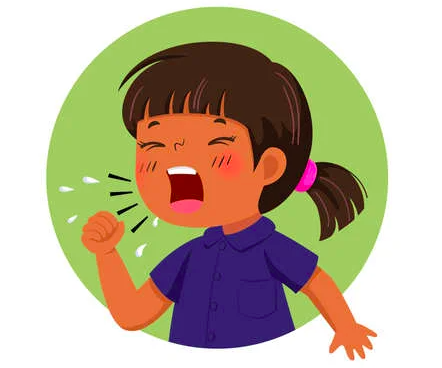Disclaimer [ENGLISH]
What is a cough?
- It is a reflex that helps your child to clear their airway
- A cough can sound dry or wet

What causes a cough?
How can I treat my child’s cough?
For infants up to 12 months:
- Reminder: no honey under 1 year of age.
- Over-the-counter cough and cold medicine is not recommended, but agave-based medications can be tried if desired for babies 6 months and older.
- Nasal saline spray or drops followed by nasal suction prior to feeding and sleep.
- Inhalers or nebulizer treatments if prescribed and advised by your child’s provider.
For toddlers ages 1 to 3 years old:
- Over-the-counter cough and cold medicine is not recommended, but honey-based medications can be tried if desired.
- Age-approved vapor rub.
- Nasal saline spray or drops followed by nasal suction prior to feeding and sleep.
- Inhalers or nebulizer treatments if prescribed and advised by your child’s provider.
For children ages 4 to 6 years old:
- Cough medicine should be used only if recommended by your child's doctor.
- Vapor rub
- Cough drops
- Honey – can be mixed in warm fluids, yogurt, or given plain on a spoon
- Nasal saline spray
- Inhalers or nebulizer treatments if prescribed and advised by your child’s provider.
For ages 6 years and older:
- Some cough medications also contain acetaminophen or ibuprofen, so parents must be careful with giving additional doses of these medications.
- Vapor rub
- Cough drops
- Honey – can be mixed in warm fluids, yogurt, or given plain in a spoon.
- Nasal saline spray
- Inhalers or nebulizer treatments if prescribed and advised by your child’s provider
How can I prevent my child’s cough?
- Practicing good hand hygiene.
- Avoid sharing food and drinks.
- Avoid sick contacts.
- Be sure to give any medications as prescribed by your child’s provider.
- Avoid any vaping or smoke exposure.
- Be sure to keep your child up to date with vaccines.
- Regularly clean high contact surfaces.
When to call your child’s provider:
- If your child is having any trouble breathing.
- If your child is wheezing.
- If the cough is not improving with treatment.
- If your child is urinating less than 3 times in 24 hours.
- If your child has a fever for five days.
- If your child’s cough has lasted longer than 4 weeks.
This publication was adapted from information within American Academy of Pediatrics Patient Education Handouts, UpToDate Guidelines and Healthychildren.org
Reviewed by: TT D.O, AR D.O. | 12/2023


